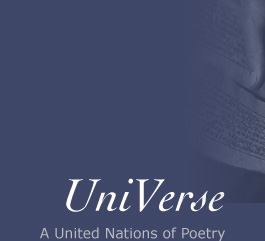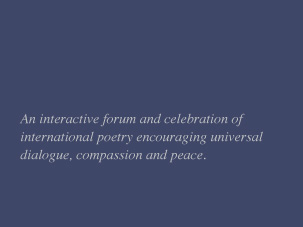| |
 |
 |
 |
 Jaime Saenz is arguably the greatest Bolivian writer of the 20th century. His poetry is apocalyptic, transcendent, and hallucinatory, influenced by Ayamara language and culture. Forrest Gander and Kent Johnson have co-translated two books of his into English, Immanent Visitor: Selected Poems of Jaime Saenz (U of CA, 2001) and The Night, a book length poem (Princeton University Press, 2007). These poems are reprinted with permission from The Night. Jaime Saenz is arguably the greatest Bolivian writer of the 20th century. His poetry is apocalyptic, transcendent, and hallucinatory, influenced by Ayamara language and culture. Forrest Gander and Kent Johnson have co-translated two books of his into English, Immanent Visitor: Selected Poems of Jaime Saenz (U of CA, 2001) and The Night, a book length poem (Princeton University Press, 2007). These poems are reprinted with permission from The Night.
|
|
|
Spanish version
Seccion 1, desde La Noche:
Luego la noche vendrá en tu ayuda
~y tan sólo ahora, a la luz de experiencias aterradoras
recientemente vividas,
te serán reveladas muchas cosas simples, al par que difíciles.
Pues si no hay riesgo, si no hay peligro, si no hay dolor y locura,
no hay nada.
El día es para respirar, para saludar, para recorrer muebles y
cambiar de sitio
algunas cosas;
el día es de oficinas, de dimes y diretes y de gente buena y
optimista,
y también de pequeños odios y de carreras de velocidad, a ver
quién llega
primero.
El día es la superficie del mundo.
La noche no.
La noche es la noche.
La noche, en las profundidades, ha imaginado una broma
pesada—pues la noche
escribe,
para buscar y encontrar.
La noche propicia para perderse y desaparecer, para renacer y
morir, en
oscuridades que te hablan y te señalan.
Por eso la luz de la noche es una luz aparte: muchas cosas, muy
extrañas,
se iluminan a la luz de la noche
—las cosas vuelven a ser como lo que son, y uno mismo llega a ser
como lo que
es.
De Santo y seña (México, Fondo de Cultura Económica, 2007).
English version
Saenz, Jaime, The Night, from Section 1
Later on, the night will rush to help you
~and just then, in the light of all that shook you,
many things will be revealed, simple and also intricate.
For if there is no risk, no peril, if there is no twinge and insanity,
there is nothing.
The day is for breathing, for hellos, for hauling furniture around and
rearranging details;
the day of offices, of tell-me’s and tell-you’s and of placid optimists,
and also of little loathings and full-tilt races to see who arrives first.
The day is the carapace of the world.
Not the night.
The night is the night.
The night, in the deepnesses, has had the last laugh—because the
night writes
in order to search and seize.
The night lends itself to loss and disappearance, the better to be
reborn and die in
darknesses that signal and address you.
So the night’s light is a light apart: many and curious things
are lit up by night’s light
~things go back to being what they are, and you come to be what
you are.
|
|
|
Spanish version
Seccion 2, desde La Noche:
¿Cuánto dura la noche?
En realidad nadie sabe, aunque le haya sida asignada una duración
de doce horas,
por razones de orden puramente práctico.
Lo cierto es que la noche dura en el espacio, mientras que el día
sólo dura en el
tiempo.
Así se explica el que a toda hora del día, uno encuentre regiones en
que la noche
mora.
Tales regiones se identifican con el musgo, con el metal, y con el
viento;
con un silencio comunicativo, que surge de las piedras, y que se
suspende en el
vacío.
Tales regiones suelen encontrarse asimismo en algunos rostros, que
se nos
aparecen fugitivamente por las calles, y que nos transmiten un mensaje.
Las regiones en que mora la noche, en pleno día, se encuentran
aquí, en este
papel,
y también allá, en el otro papel.
Y se encuentran en muchos lugares, en muchas personas, en
muchos animales, y
en muchos objetos.
A la primera mirada, y aun por el tacto y por el olor, uno puede
reconocer estas
regiones.
En un talismán de estaño, por muchos años olvidado en alguna
gaveta;
en un sobre de color oscuro, con una inscripción que no se lee ya,
encontrarás una región que habita la noche;
en esas piedras del camino, que parecen esperarte, y parecen
mirarte.
En alguna llave, inservible ya, y venida a menos, que se esconde en
tu bolsillo;
en esa cicatriz, que ha aparecido sin saberse cómo, en tu mano
izquierda
—en alguna concavidad de tu calavera, que muchas veces te
escuece sin saberse
por qué,
encontrarás una región que habita la noche.
Y la encontrarás en ese rayo de luz, que se filtra por la ventana,
y que alumbra el vuelo del moscardón.
English version
Saenz, Jaime, The Night, from Section 2
How long does the night go on?
No one can guess, even if, for purely practical reasons, it’s been
assigned twelve hours.
The sure thing is that night endures in space, while day takes place
purely in time.
That’s why at any given time of day you can find regions where the
night dwells.
Such regions are signed with moss, metal, and wind;
with a pregnant silence that oozes from the stones and hovers in
emptiness.
Such regions are often found, just the same, on certain faces which
abruptly appear to us on
the streets, disgorging their message.
The regions where the night, in plain day, dwells, are to be found
here, on this very
paper,
and also over there, on that other paper,
and they are to be found in many places, in many people, in many
animals, many
objects.
At a glance, even by touch and scent, you can discern these regions.
In a tin fetish, long forgotten in a drawer;
in a dark-hued envelope, in a faded inscription,
there you’ll come across a region where night dwells;
in those stones along the path, which seem to wait for you, watching
you.
In an old and useless key buried in your pocket;
in that scar, from who knows what, on your left hand
~in some crater of your skull, which often burns without warning,
there you’ll find a region where the night dwells.
And you’ll find it in that sunbeam which the window softens,
and which renders the flight of the blowfly.
|
|
|
Spanish version
Seccion 4, desde La Noche:
¿Qué es la noche?—uno se pregunta hoy y siempre.
La noche, una revelación no revelada.
Acaso un muerto poderoso y tenaz,
quizá un cuerpo perdido en la propia noche.
En realidad, una hondura, un espacio inimaginable.
Una entidad tenebrosa y sutil, tal vez parecida al cuerpo que te
habita,
y que sin duda oculta muchas claves de la noche.
*
Cuando pienso en el misterio de la noche, imagino el misterio de tu
cuerpo,
que es sólo una manera de ser de la noche;
yo sé de verdad que el cuerpo que te habita no es sino la oscuridad
de tu cuerpo;
y tal oscuridad se difunde bajo el signo de la noche.
En las infinitas concavidades de tu cuerpo, existen infinitos reinos de
oscuridad;
y esto es algo que llama a la meditación.
Este cuerpo, cerrado, secreto y prohibido; este cuerpo, ajeno y
temible,
y jamás adivinado, ni presentido.
Y es como un resplandor, o como una sombra:
sólo se deja sentir desde lejos, en lo recóndito, y con una soledad
excesiva, que no te
pertenece a ti.
Y sólo se deja sentir con un pálpito, con una temperatura, y con un
dolor que no te
pertenecen a ti.
Si algo me sobrecoge, es la imagen que me imagina, en la
distancia;
se escucha una respiración en mis adentros. El cuerpo respira en
mis adentros.
La oscuridad me preocupa—la noche del cuerpo me preocupa.
El cuerpo de la noche y la muerte del cuerpo, son cosas que me
preocupan.
*
Y yo me pregunto:
¿Qué es tu cuerpo? Yo no sé si te has preguntado alguna vez qué es
tu cuerpo.
Es un trance grave y difícil.
Yo me he acercado una vez a mi cuerpo;
y habiendo comprendido que jamas lo habia visto, aunque lo llevaba
a cuestas,
le he preguntado quién era;
y una voz, en el silencio, me had dicho:
Yo soy el cuerpo que te habita, y estoy aquí, en las oscuridades, y
te duelo, y te
vivo, y te muero.
Pero no soy tu cuerpo. Yo soy la noche.
English version
Section 4 from The Night
What is the night—you ask now and forever.
The night, a revelation still veiled.
Perhaps a deathform, tenacious and flexed,
perhaps a body lost to the night itself.
Truly, a chasm, a space unimaginable.
A subtle, lightless realm, not unlike the body dwelling in you,
which hides, surely, many clues to the night.
*
When I consider the night’s mystery, I imagine the mystery of your
body,
which is only one of the forms of night’s being;
I know beyond doubt the body that inhabits you is nothing more
than the darkness of
your body;
and this darkness is diffused under the night’s sign.
In the countless concavities of your body there are multiple
kingdoms of darkness;
and this is something worth reflection.
This body, closed, secret, and forbidden; this body, other and
fearsome,
neither foretold nor foreseen.
And it is like a resplendence or like a shadow:
it only allows itself to be sensed from afar, from the indeterminate,
charged with excessive
loneliness which has nothing to do with you.
And it only allows itself to be sensed feelingly, through temperature,
and through a sorrow
that has nothing to do with you.
If anything fills me with awe, it is the image that imagines me from
afar;
a breathing heard at my core. The body breathes at my core.
Darkness rivets me—the body’s night rivets me.
The body of the night and the death of the body rivet my mind.
*
And I ask myself:
What is your body? I don’t know whether you’ve even asked
yourself.
It’s a gambit, grave and adverse.
One time I came close to my body;
and realizing I had never seen it, even though I bore it with me,
I asked it who it was;
and a voice, in the silence, said to me:
I am the body who inhabits you, and I am here in the darkness, and
I suffer you, and live
you, and die you.
But I am not your body. I am the night.
|
|
|
|
 |
|





